Frozen bananas are great to have on hand for smoothies, baking, and more. In this guide, I’ll cover the best methods for freezing banana slices and mashed bananas, along with tips to avoid common pitfalls and ensure optimal results.
I’m someone who doesn’t think about what to do with the food in their refrigerator until an hour before we leave for vacation. I recently came across a whole, unpeeled banana in our freezer… from who knows when. My husband said he threw it in there at some point before a vacation.
I thought I could just defrost it and use it in a smoothie. Nope.
That was a nasty banana. It had pretty much liquified.
With so many people going on vacation now, I thought I’d post this quick how-to guide on how to freeze bananas. There’s really not much to it, but hopefully someone finds it helpful. 🙂
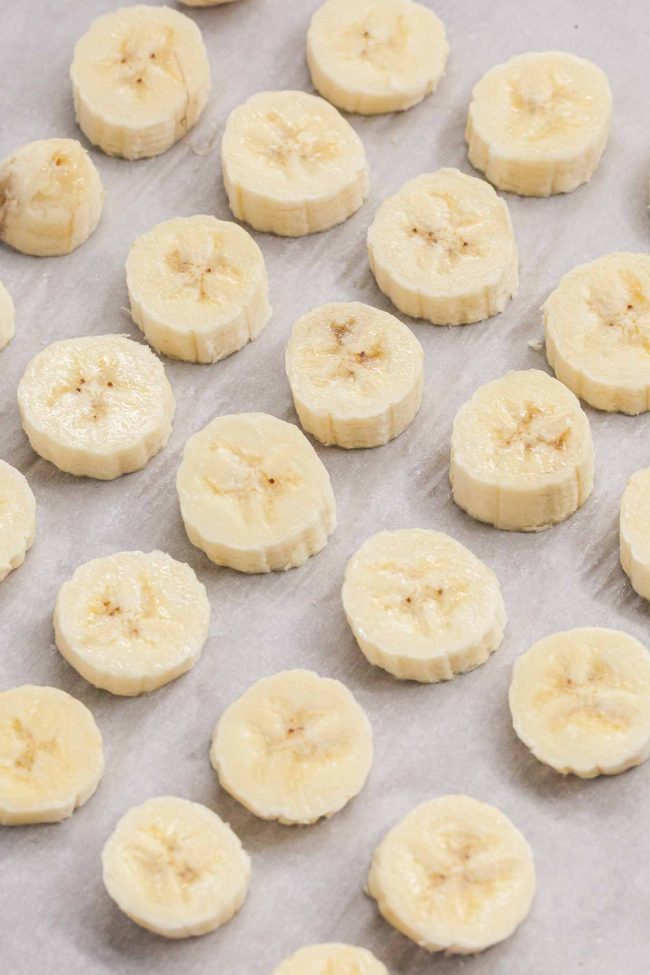
Why freeze bananas?
Freezing bananas is a fantastic way to preserve them for future use. There are several reasons to freeze bananas.
- Convenience – you don’t have to worry about not having ripe bananas on hand for smoothies, and you won’t have to wait around 5-7 days until your bananas ripen enough for banana bread. Being stocked with frozen bananas means you’re always ready for some banana action. 🙂
- Reduces waste – instead of throwing away overripe bananas, you can freeze them.
- Cost-effective – you can buy bananas in bulk when they’re on sale and freeze them for later use.

How to freeze banana slices
This is the best option for smoothies.
-
Choose ripe bananas
– you’ll want to select bananas that are ripe with a few brown spots. Not very brown or almost black bananas because you’re not going to be able to easily slice them.If you want to freeze slices, rather than mashed bananas, you should freeze them before they get to that point! Also, if using them for future smoothies, you don’t want them banana-bread-brown. It adds too much banana flavor, in my opinion.
- Peel and slice – they should be about 1/4″ to 1/2″ (.6 to 1.2 cm) thick. Uniform slices ensure even freezing, but it really doesn’t matter all that much. I don’t recommend slices thicker than 1/2″ because thicker slices are too hard on the blender.
- Arrange on a baking sheet – put the slices in a single layer on a baking sheet lined with parchment paper. Ensure the slices don’t touch to prevent them from sticking together.
- Flash freeze – put the baking sheet in the freezer for 2-3 hours or until the banana slices are solid.
- Transfer to a freezer bag – once the slices are frozen, transfer them to a resealable freezer bag. Label the bag with the date for reference. And yes, I might have done that with Canva after realizing the dates were missing from the bags. 😉
- Store in the freezer – store the frozen bananas in the freezer for up to 6 months. Use them directly from the freezer for smoothies or thaw them slightly and mash if you want to use them for baking.
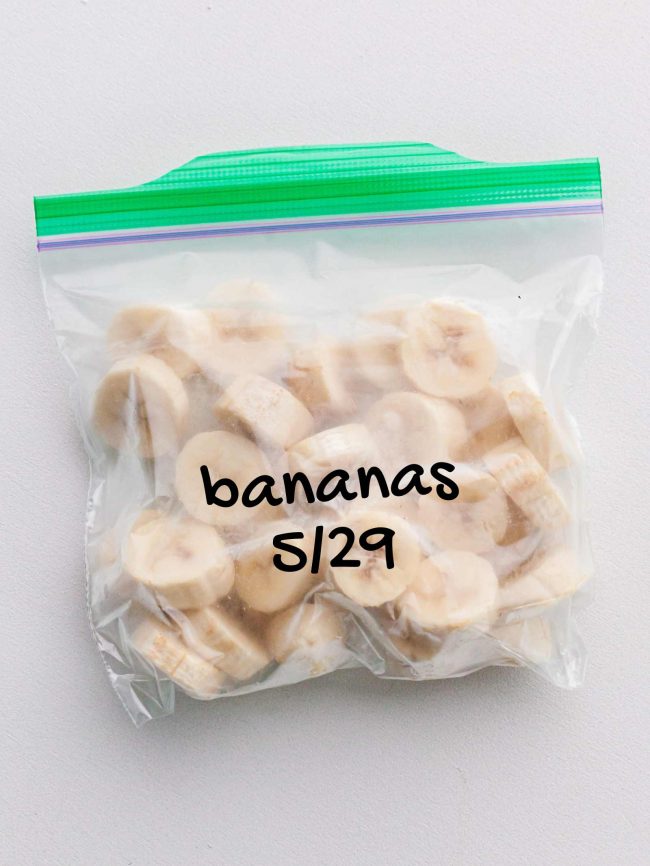
How to freeze mashed bananas or banana puree
Freezing mashed bananas is perfect for baking banana bread, banana muffins, and other treats. Here’s how to do it:
- Choose super ripe bananas – if you’d like to use your mashed bananas for future banana bread or other baked banana recipes, it’s best if your bananas are just as ripe as you’d like to use in your banana bread. If you’re unsure of when exactly that is, read the section below for some tips.
- Peel and mash – use a fork, potato masher or the bottom of a flat glass until smooth. You can leave some chunks if preferred for texture in baking. Or you can puree them if you don’t like chunks in your baked goods.
- Portion – each portion should be about the amount you would need for your recipes. If you don’t have any recipes in mind, 1/2 cup or 1 cup portions are good. Transfer the mashed bananas into freezer-safe containers or resealable freezer bags. I always use Ziplocs to save space. I place the bag in a small mixing bowl, open it up, and transfer the mashed bananas to the bag.
- Label – make sure to write the date and the portion size on your bag or create a little label for your container.
- Freeze – lay the bags flat in the freezer to save space. Once frozen, you can stack them. They’ll stay good for up to 6 months.
- Thaw – let the mashed bananas thaw in the refrigerator overnight or at room temperature for a few hours. Use them in baking recipes or any dish that calls for mashed bananas.
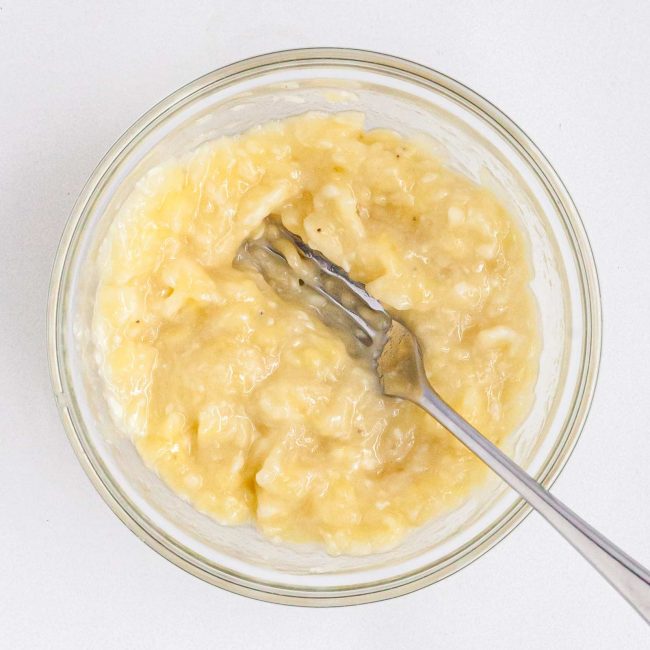
When are bananas ready for banana bread?
You’ll know it’s ready when the peel is covered in brown spots. It can even be fully brown or black. A few yellow patches are okay, but the more brown spots, the better.
At this stage, the banana should feel very soft to the touch. If you gently squeeze it, it should give easily.
They’ll also have a strong, sweet banana smell.
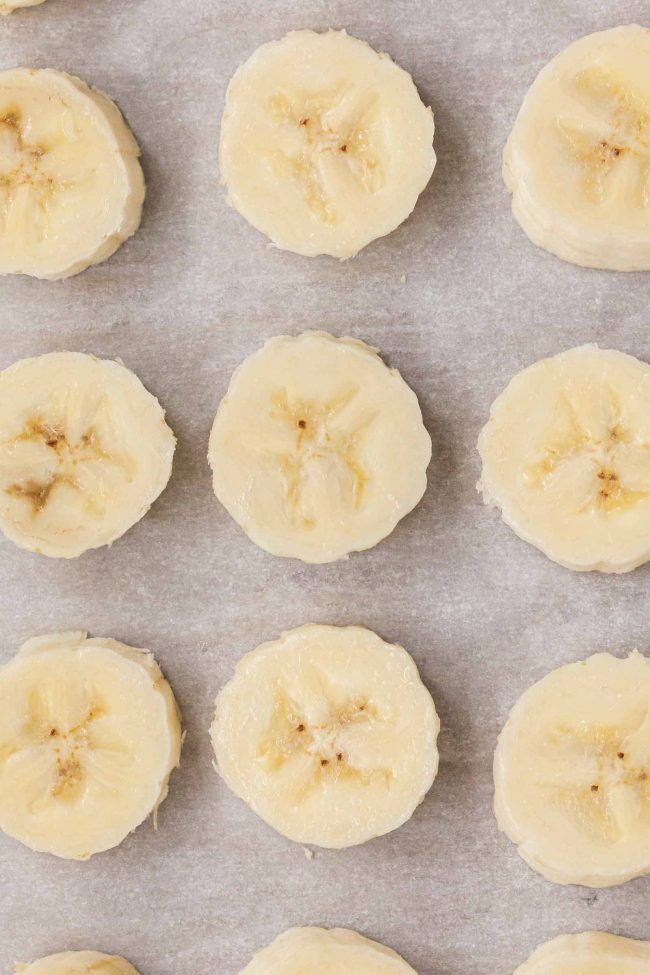
The texture of thawed bananas after freezing
When bananas are frozen and then thawed, their texture changes significantly. Here’s what you can expect:
Thawed banana slices
- Softer texture – thawed banana slices become much softer and slightly mushy due to the breakdown of cell walls during freezing and thawing. They definitely won’t hold their shape as well as fresh slices.
- Moisture release – expect some moisture release as the slices thaw. This can make them appear wetter and maybe even slimy. I wouldn’t recommend using frozen slices to top off a banana cream pie or anything else.
Thawed mashed bananas
- Smooth and pasty – mashed bananas, once thawed, retain a smooth and pasty consistency. They can become a bit more liquid due to the water content being released during thawing.
- Uniform consistency – the texture will be consistent throughout, making them ideal for baking where a smooth incorporation into the batter is desired.
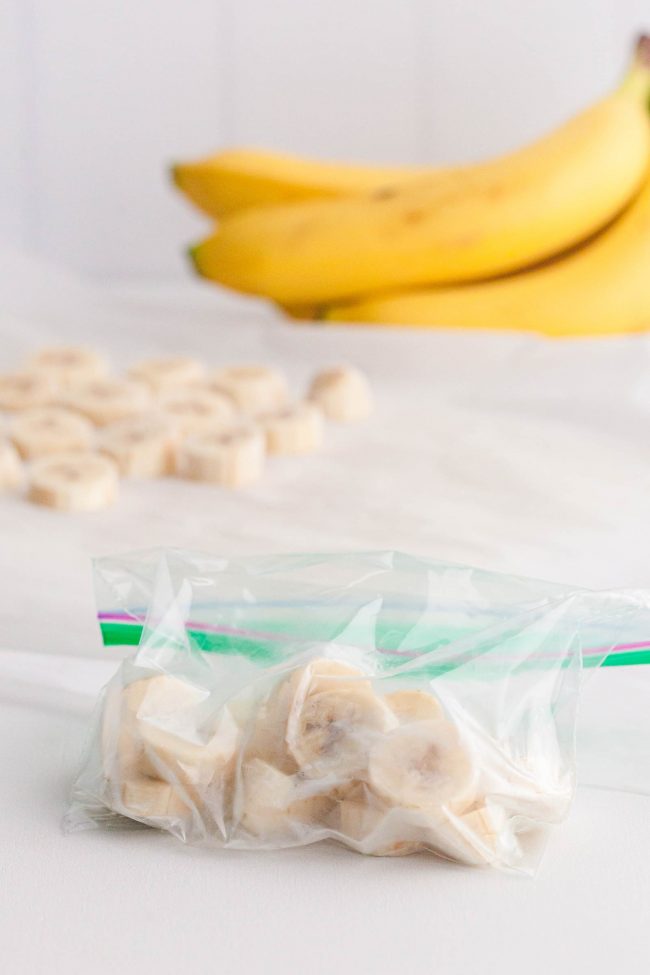
Other pitfalls
While freezing bananas is a convenient way to preserve them, there are some potential pitfalls to be aware of. Knowing these can help you avoid common mistakes and ensure the best results.
Other than the texture changes I just talked about, here are a few other potential issues:
- If you don’t freeze banana slices long enough, they can clump together in the bag, making it difficult to separate them when you need a small portion.
- Bananas can absorb odors from the freezer if not stored properly, which can affect their flavor.
- While freezing is great for overripe bananas, if they are too far gone, they might not freeze well and could become excessively mushy and watery upon thawing.
- Freezing bananas in large batches without portion control can lead to wastage if you thaw more than you need. Freeze bananas in portions that match your typical use, whether in slices or mashed form, to avoid thawing excess amounts.
Can I snack on frozen bananas after they’ve thawed?
Nope. The texture of a frozen banana that’s been thawed is terrible for snacking.
If you want to snack on them while they’re still partially frozen, that’s fine. They’re still good.
But once they’ve completely defrosted, they’re total mush.
What to use frozen bananas in
Mashed bananas
I haven’t tried using frozen and defrosted bananas in no-bake treats like these No-bake Peanut Butter Pies, but I’m guessing it’s not a good idea due to the texture reasons I wrote about above.
I think it’s best to stick to baked recipes. Here are some of my favorites:
Slices:
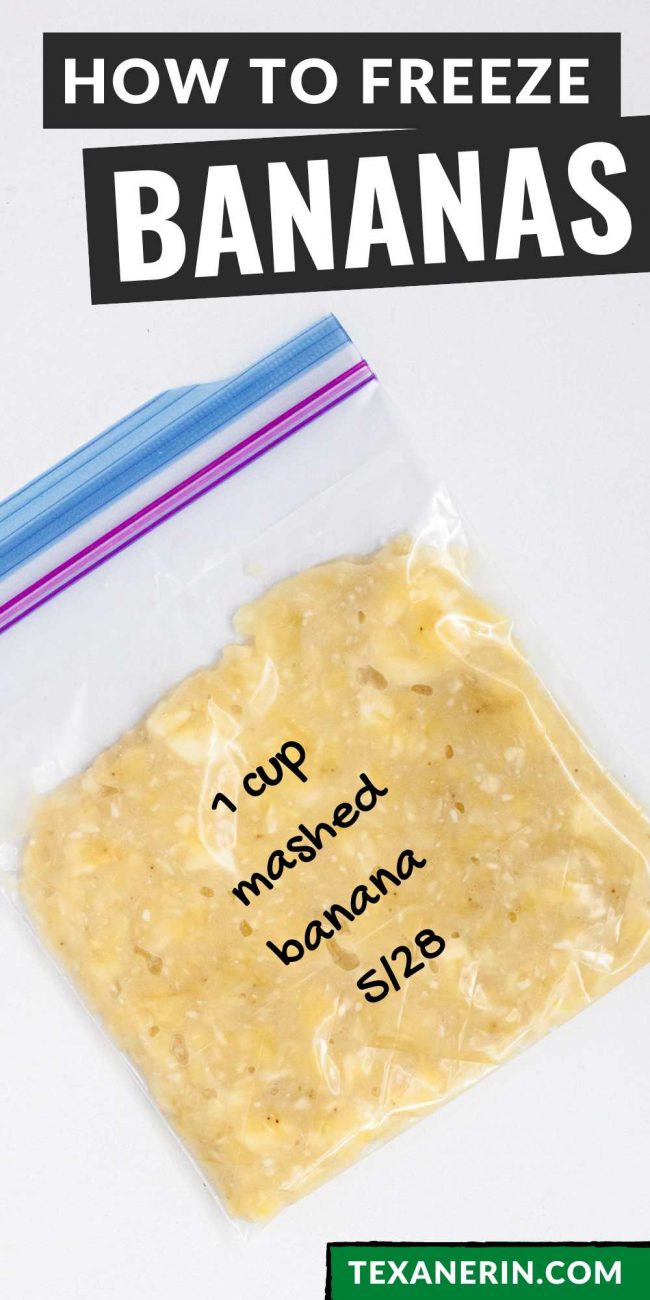
Freezing bananas is an easy and effective way to reduce waste and ensure you’ll always have this versatile fruit on hand. Feel free to share your experiences or any additional tips you might have in the comments below.
Happy freezing! I’ll be back tomorrow with a smoothie that uses frozen banana slices (or fresh bananas if you don’t have frozen on hand).
❀
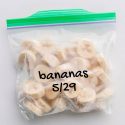
- Prep Time:
- Cook Time:
- Ready in:
- Yield: varies
Ingredients
- ripe bananas with a few brown spots, peeled
- super ripe bananas that are almost completely brown or black, peeled
For banana slices:
For mashed bananas:
Directions
- Cut into rounds about 1/4″ to 1/2″ (0.6 to 1.2 cm) thick.
- Arrange the slices in a single layer on a baking sheet lined with parchment paper, making sure they do not touch to prevent sticking.
- Flash freeze the slices by placing the baking sheet in the freezer for 2-3 hours or until the banana slices are solid.
- Once frozen, transfer the slices to a resealable freezer bag and label it with the date.
- Store the bag in the freezer for up to 6 months. Use the frozen slices directly in smoothies or thaw them slightly for mashing if you want to use them for baking.
- Mash the bananas with a fork or potato masher until smooth. You can leave some chunks for texture in baking or puree them if you prefer a smoother consistency.
- Portion the mashed bananas according to the amount you typically need for your recipes. If you don’t have specific recipes in mind, 1/2 cup or 1 cup portions work well.
- Transfer the mashed bananas into freezer-safe containers or resealable freezer bags.
- Place the bag in a small mixing bowl, open it, and transfer the mashed bananas into the bag.
- Label the bags with the date and portion size.
- Freeze the bags flat to save space. Once frozen, you can stack them. Freeze for up to 6 months.
- To thaw, let the mashed bananas sit in the refrigerator overnight or at room temperature for a few hours. Use them in baking recipes or any dish that calls for mashed bananas.

